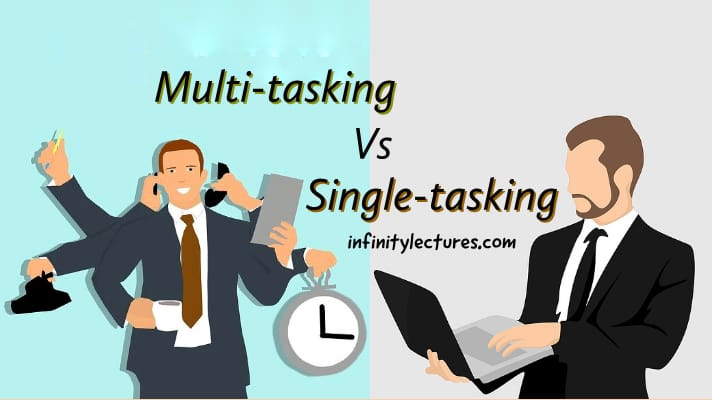Multitasking is really a great way to complete a lot of tasks within a short duration. It seems to be an important skill in today’s world. But ever wondered how multitasking is ruining your work efficiency? If not, then you really need to read this complete article about Single-tasking vs Multi-tasking.
HIGHLIGHTS: Single-tasking vs Multi-tasking
• Understanding Multitasks
• Understanding Single tasks
• Identifying when to multi-task and when not
• Why Single-tasking is better?
• Conclusion
If we compare Multi-tasking with Single-tasking there will be many instances where we find multitasking better than single-tasking and vice versa.
- If we want to finish more tasks within a limited time period, Multi-tasking is a good choice.
- If we want to increase the quality and efficiency of a task, then Single-tasking is better.
But where Multi-tasking has various mental and physical side effects, Single-tasking is always favorable. People actually don’t realize the negative effects happening to them.
UNDERSTANDING MULTI TASKS
Multi-tasking is believed to be responsible for making more mistakes and errors due to a lack of detailed information and focus. Sometimes, this may lead to serious issues and may harm you financially or in other ways.
Multi-tasking also affects your health. Multi-tasking can cause memory-related problems. You may find difficulty in learning things, can’t remember things, and can’t maintain focus for longer duration which ultimately results in increased stress levels. Multi-tasking also hinders your brain’s ability to solve complex problems.
Multi-tasking is no doubt important for us. One can not avoid it completely. But you can minimize multi-tasking in your everyday life. Some bad examples of Multi-tasking are surfing through the internet while eating, talking on the phone while driving, completing Assignments while watching TV, etc. Whereas, some good examples of Multi-tasking include buying groceries while out for a walk, preparing lunch while washing clothes (if you are using washing machine), sending bulk messages/mail, etc.
UNDERSTANDING SINGLE TASKS
One major benefit of choosing Single-tasking is a stress-free life. You don’t need to switch your brain from one task to another simultaneously. Due to which, one can be more productive throughout the single task and less prone to make errors. A famous line says that “DO ONE THING AT A TIME, AND DO IT WELL”.
Single-tasking not only improves your brain’s attention span but also makes you creative by allowing your brain to work under the preferred situation without any pressure. By doing a single task, you avoid
- Distractions
- Time waste
- Confusion
- Mislead or Misguide and
- Failure Risks
If you find Single-tasking time-wasting, then these are the PRO TIP you should consider-
- Always set a deadline or say a time limit to finish your task before you actually begin your task.
- Don’t forget to prepare a To-do list for your tasks of the day. Keep it limited rather than making it bulky.
- Keep small breaks between the two tasks to avoid any lethargic feelings.
Also read: 10 Biggest Time wasters.
So, we see that Single-tasking is much healthier than Multi-tasking in both aspects, health, and results. Now let’s see how to identify when to multi-task and when to do a single task.
IDENTIFYING WHEN TO MULTI-TASK AND WHEN TO NOT
Now you know the different benefits of single-tasking and multi-tasking, let’s discuss timings. A perfect Multitasking personality is rare. Not everyone can be a perfect multi-tasker. So, it is important for you to identify the situations where you should multi-task and situations where you need to avoid it.
Multi-tasking is preferred where you don’t need to focus i.e. when your task is mainly physical and doesn’t need any special attention. But when it comes to tasks which involve some brain work, avoid Multi-tasking. Sometimes, you don’t realize that you are multi-tasking and this could be wasting your time more than you think.
For example, you are in you are learning guitar along with your graduation. But you are thinking about guitar while studying and during guitar classes, you are thinking about the next day’s class test. Neither you are able to focus on your studies, nor you are learning guitar properly. This is clearly a waste of time and resources.
WHY SINGLE-TASKING IS BETTER THAN MULTI-TASKING?
If you ever had tried Multi-tasking, you might have noticed how fast you are losing your energy. That’s not because you are tired physically, but because you are using your brain more than normal. You keep switching between different tasks simultaneously which is making your brain tired. Every time you switch between tasks, you also lose some amount of time it takes your brain to refocus.
Single-tasking, on the other hand, save your brain’s energy by keeping your attention limited to a single task. So, instead of losing energy faster, you can do more things more efficiently and effectively, and improve your productivity.
Next thing is, you get a chance to learn things and discover new things when you focus only on a single task. Multitasking kills your creativity level. What you focus on is completing different tasks as soon as possible and neglect the learning process.
One more quality that Single-tasking promotes is self-discipline. You need to bound yourself to the task so that you cannot jump to other tasks in between your ongoing task.
CONCLUSION: Single-tasking vs Multi-tasking
Multi-tasking is important sometimes and you cannot rely on single-tasking all the time. But I recommend choosing Multi-tasking only when you need to. You need to make a balance between the two. Try to practice Multi-tasking in small steps. Train your brain for this. I hope you will not face any difficulty in choosing between multi-tasking and single-tasking after reading this article.



